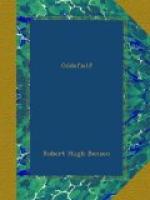Of my Cousin Dorothy I had heard scarcely anything at all; for the last letter I had had from Hare Street was at Eastertide; and Tom said not very much about his daughter, except that she was pretty well; and that he thought of taking her to town in the summer for a little. The rest of his letter was, two-thirds of it all about Hare Street and the lambs and how the fruit promised; and one-third of the affairs of the kingdom.
These affairs, of which I learned from other sources besides my Cousin Tom, were, in brief, as follows.
His Majesty, for the first time, since he had come to the throne, had shewn an extraordinary open courage in dealing with the country-party. (I must confess that my success in France was not wholly without connection with this. He was so much strengthened in French affairs that he felt, I suppose, that he could act more strongly at home.)
First, in January, he had dissolved the Parliament that had threatened the exclusion of the Duke of York, and that would vote him no money till he would yield. First he prorogued it, though there was a great clamour in his very presence; and then he dissolved it, coming in so early in the morning that none suspected his design.
Then he summoned a new Parliament to meet at Oxford: for at Oxford he knew he would have the support of the city, whereas at London he had not. That Parliament at Oxford will never be forgotten, I think; for it was more like an armed camp than a Parliament. Both parties went armed. My Lord Shaftesbury, in order to rouse the feeling on his side, went there in a borrowed coach without his liveries, as if he feared arrest or even death. But His Majesty answered that by himself going with all his guards about him, as if for the same reason. There were continual brawls in the city, and duels too. The parties went about like companies of cats and dogs, snarling and spitting at one another continually; and so fierce was the feeling that nothing could be done. My Lord Shaftesbury’s creatures were still strong enough to hold their own; and at last His Majesty did the bravest thing he had ever done. He caused a sedan-chair to be brought privately to his lodgings, and his crown and robes to be put in there. Then he went in himself, and away to where the House of Lords was sitting, and before anyone could utter a word, he dissolved the Parliament once more, and altogether, and never again summoned another.
But that was not all.
First, it appeared as if even His Majesty himself was frightened at what he had done, for he allowed my Lord Archbishop of Armagh, Dr. Oliver Plunket, to be convicted and executed in London, clean contrary to all evidence or right or justice—just because he was a Papist, and the popular cry had been raised against him that he was conspiring to bring the French over to Ireland, whereas he was a good and kindly old man, who lived in the greatest simplicity and neither did nor designed harm to any living creature.




